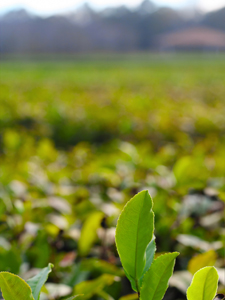Want to Visit a Tea Estate? No Need for a Passport

Nothing beats the experience of seeing and smelling the biting freshness of just-plucked tea leaves. Visitors to farms in Japan, China, India, Sri Lanka and other countries all attest to the experience of seeing how teas are grown, plucked and processed as revelatory and life changing. Most of these trips are a day's travel away, expensive and take several weeks to get the most out of the experience. Fortunately, one can visit tea-growing farms right here in this country. Some farms are still experimental, the yield tiny, the choice of teas limited, but others are remarkable for their innovation and for the pure pleasure of seeing how our favorite beverage begins its humble journey. In Michigan, biodynamic farmer Angela Macke's Light of Day Organics is a very modest, yet thriving 3,000 square feet of tea in hoop houses. She grows the tea plants that she sprouts from her own tea seeds which are processed in a full range of teas from white to puerh. Using Demeter biodynamic solutions of cow dung in water, she soaks the seeds for 48 hours and uses frequent watering to establish the roots prior to planting them in the ground. She also grows hundreds of botanicals for use in blending with teas or to use alone. You can order her teas online or attend her tea classes from June through November. For specific information, visit www.lightofdayorganics.com. The farm is at 3502 E. Traverse Hwy. Traverse City, MI 49684 or call 231.228.7234 or write angela@lightofdayorganics.com What began as Pinehurst Tea Plantation in 1888 has evolved into the Charleston Tea Plantation that's a refreshing introduction to tea farming. The tea farm, under the American Classic Teas brand that began in 1987 with co-founder William Barclay Hall, is currently owned by the Bigelow Company. You can board a trolley car to tour the farm's 127 acres, hear a taped narration by Hall. Or take a video tour of the factory to see how the leaves are processed and visit the Propagation Hut to learn how the best quality plants are selected for new acreage, how cloning is done and other essential information on the tea-growing process. Tours are offered from 10 a.m. to 4 p.m. Monday through Saturday, and from 12 noon to 4 p.m. on Sundays all year round except major holidays. 6617 Maybank Hwy, Wadmalaw Island, SC 29487, (843) 559-0383 The original four Sakuma brothers began with strawberries on an island off the shore of Washington state which soon expanded to multi-berry production. In 1997, tea was added to their farm and the brothers were joined by John Vendeland (former director of diversified agriculture for the Lipton tea company in Hawaii). They started with Camellia assamica, and it took seven years before they had vital plants. Harsh winters of the Pacific Northwest nearly wiped out the plants but, since 2010, conditions have improved and growth and health of the plants have been consistent. Today, the farm produces a line under the Sakuma Market Stand brand for sun-dried white, green, and oolong teas that are all hand-picked and hand-crafted. They do not have official tours, but visits can be arranged by calling 360-757-6611 or writing plants@sakumabros.com. Roy Fong, who has been a tea guru and key importer of a wide range of fine teas from China to his Imperial Tea Court shops in San Francisco, has overseen the planting and harvesting of teas on small tea farms in Mainland China and their subsequent processing. This hands-on involvement led him to experiment closer to home on 23 acres of tea on his farm just north of the city. The trial-and-error period seems to be over and cuttings have successfully taken root and are sprouting baby leaves. Can a great cup of tea be far behind? Follow Roy on twitter @royfongtea for all the news and updates. Minto Island Growers Tea Project just outside of Salem Oregon on the edges of Minto Brown Island Park, is now offering teas from its years-long experiment in tea growing. Co-owned and operated by Elizabeth Miller and Chris Jenkins since 2007, the 40-acre farm is certified organic and includes two acres containing more than 200 varietals of Camellia sinensis at 3394 Brown Island Rd S, Salem, OR 97302. They host tea classes in conjunction with the fall and summer tea harvests. For information on 2015 classes, contact elizabeth@mintogrowers.com 503-931-6840 or visit their website at www.oregonteacrafters.com Other efforts in tea growing in the U.S. include The Great Mississippi Tea Company in Alabama and the non-commercial 30/90 Tea in New Orleans, Louisiana. The most ambitious tea-growing state of all is Hawaii. The Hawaii Tea Society currently has 40 members and has loads of information and offers free tea farm tours during June.
